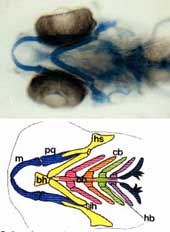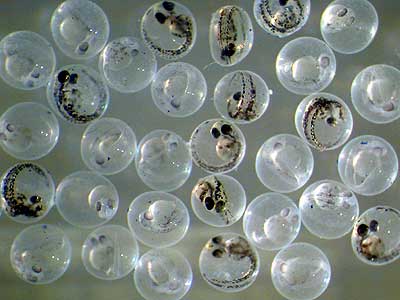Pharyngula
Evolution, development, and random biological ejaculations from a godless liberal
Search
Profile

PZ Myers is a biologist and associate professor at the University of Minnesota, Morris.
![]() …and this is a pharyngula stage embryo.
…and this is a pharyngula stage embryo.
• a longer profile of yours truly
• my calendar
• Nature Network
• RichardDawkins Network
• facebook
• MySpace
• Twitter
• Atheist Nexus
• the Pharyngula chat room
(#pharyngula on irc.synirc.net)
• Quick link to the latest endless thread
Random Quote
I would rather live and love where death is king than have eternal life where love is not.
[Robert G. Ingersoll]
Recent Posts
- Dismal news from Ireland
- Grand news from Ireland!
- Sunday Sacrilege: Magic words
- Hardcore and Hard
- I get email
- Episode XXXIX: Play ‘Spot the Moron!’
- The wild bunch
- Wild times with the laughing godless
- This is a 100% accurate portrait of daily life at Scienceblogs
- Uh-oh…we aren't being nice and respectful of the faithful
A Taste of Pharyngula
Recent Comments
- PZ Myers on Sunday Sacrilege: Magic words
- glenister_m on Dismal news from Ireland
- Patricia, Ignorant Slut OM on Sunday Sacrilege: Magic words
- deriamis on Sunday Sacrilege: Magic words
- BlueEyedVideot on I get email
- Demonhype on Sunday Sacrilege: Magic words
- bart.mitchell on Sunday Sacrilege: Magic words
- Caine, Fleur du mal on Grand news from Ireland!
- Rorschach on Dismal news from Ireland
- hyman.rosen on Sunday Sacrilege: Magic words
Archives
- March 2010
- February 2010
- January 2010
- December 2009
- November 2009
- October 2009
- September 2009
- August 2009
- July 2009
- June 2009
- May 2009
- April 2009
- March 2009
- February 2009
- January 2009
- December 2008
- November 2008
- October 2008
- September 2008
- August 2008
- July 2008
- June 2008
- May 2008
- April 2008
- March 2008
- February 2008
- January 2008
- December 2007
- November 2007
- October 2007
- September 2007
- August 2007
- July 2007
- June 2007
- May 2007
- April 2007
- March 2007
- February 2007
- January 2007
- December 2006
- November 2006
- October 2006
- September 2006
- August 2006
- July 2006
- June 2006
- May 2006
- April 2006
- March 2006
- February 2006
- January 2006
Blogroll
Other Information

"Pharyngula" is a term coined by William Ballard to describe a particular stage in the development of the vertebrate embryo. At the pharyngula stage, the vertebrate embryo
- is at the phylotypic stage, an evolutionarily conserved period when vertebrate embryos of all species are most similar to one another.
- has assembled at least the rudiments of most of the major organ systems.
- is expressing the well-known series of Hox genes, regulatory genes responsible for patterning the embryo.
- has a repeated series of pharyngeal arches. These are characteristic chordate tissues that form a 'basket' of cartilage and associated tissues in the throat; they contribute to jaws and facial structures, ear bones, gill arches, etc.
It's an interesting and important period of embryonic development, and happens to be the period my students and I spend a lot of time studying.
If you're wondering how to pronounce it, try "fa-RING-you-la" or "fa-RINJ-you-la."
About zebrafish...

My preferred experimental animal is the zebrafish, Danio rerio. The great thing about zebrafish for research in development is that they are prolific, producing many eggs every day, and that the embryos develop rapidly, reaching the pharyngula stage 24 hours after they are fertilized.

About UMM...

This is where I work, at the University of Minnesota, Morris, one of the four campuses of the University of Minnesota system. I'm a member of the biology discipline, within the Division of Science and Mathematics.
About me...
I'm an associate professor of biology at UMM. I can be contacted at [email protected], or by IM at [email protected] or [email protected], and by phone at (320) 589-6343.
Education
| 1985 | Ph.D. in Biology, Institute of Neuroscience,University of Oregon, Eugene, OR |
| 1979 | B.S. in Zoology, University of Washington, Seattle, WA |
| 1975-1976 | attended DePauw University, Greencastle, IN |
| 1973-1975 | attended Kent-Meridian High School, Kent, WA |
Employment
| 2003- | Associate Professor, Division of Science and Math, University of Minnesota, Morris |
| 2000-2003 | Assistant Professor, Division of Science and Math, University of Minnesota, Morris |
| 1993-2000 | Assistant Professor, Department of Biology, Temple University |
| 1991-1993 | Research Assistant Professor in the Department of Biology, University of Utah |
| 1988-1991 | Post-doctoral research associate with Dr. Michael J. Bastiani in the Department of Biology, University of Utah |
| 1985-1988 | VAX system manager and programmer for the Institute of Neuroscience, University of Oregon |
| 1979-1985 | Graduate research with Dr. Charles B. Kimmel at the Institute of Neuroscience, University of Oregon |
About this site...
On the main page, there are a few randomized subsets of various bits and pieces of information displayed. If you've been itching to see them all in one place, here they are.
- The complete random quote file. Some people find some of them offensive; so do I. I do not agree with every one of them, but just find them thought-provoking, or humorous, or unbelievable…so don't bother complaining to me.
- The complete "Taste of Pharyngula" file. These are links to some of the science articles I've posted here.
- The complete blogroll.
















